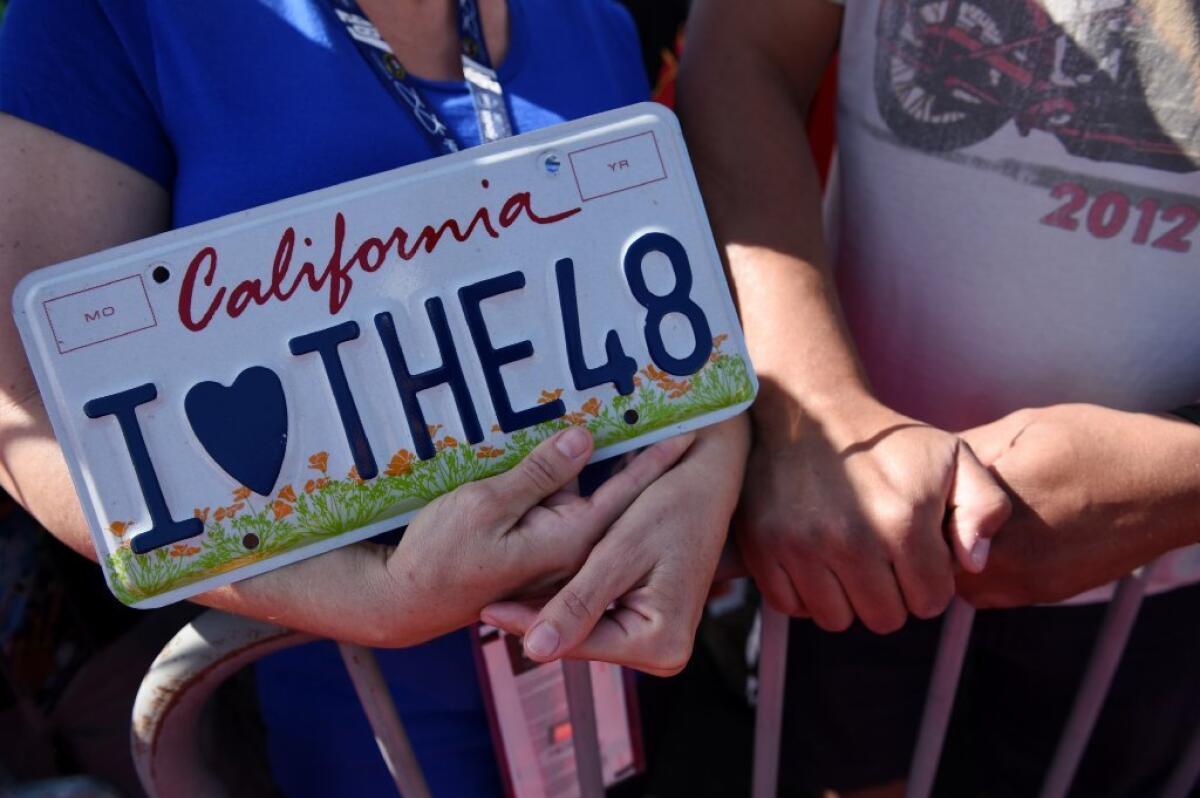How much freedom of speech can your license plate have? New suit could decide

- Share via
After an honorable discharge following four oversea tours, Paul Ogilvie bought a car and wanted to combine two of his nicknames to create a personalized license plate.
He decided on “OGWOOLF,” a combination of his military nickname, using the first two letters of his last name and “woolf,” an online screen name he’s used since 1999.
But the California Department of Motor Vehicles rejected Ogilvie’s application because his request didn’t meet the agency’s criteria.
Now the libertarian Pacific Legal Foundation is legally challenging the DMV’s environmental license plate program on behalf of five California residents, including Ogilvie, on 1st Amendment grounds. The lawsuit filed in federal court in San Francisco this week alleges the DMV acts as speech police, limiting personal expression for “arbitrary” and “laughable” reasons.
“Like many Californians, our clients wanted to express messages like their nickname from the military, favorite rock band or love of motorcycles,” attorney Wen Fa said. “They shouldn’t be prevented from expressing those messages based on a DMV official’s hunch that those messages are offensive.”
Department officials declined comment on the pending litigation, which challenges a program that brought the state nearly $60 million last year.
This legal challenge follows another federal judge’s recent ruling that environmental license plates “unequivocally express personal speech and not government speech,” the lawsuit argues.
In that challenge, filed by the same nonprofit legal organization, the department eventually allowed California soccer fan Jonathan Kotler to honor his favorite team with the vanity plate “COYW,” but the department didn’t change its policy. Kotler supports London-based Fulham, whose fans often chant “Come On You Whites” for their players in white jerseys.
In 2018, the department denied over 30,000 personalized license plate applications of the 249,000 requests received because the proposed language didn’t meet the department’s criteria, according to the suit.
According to the DMV’s special interest license plate ordering system, the department will refuse any request if it carries offensive connotations to good taste and decency or if it is misleading. Before a person submits a request, the DMV outlines a list of guidelines describing what isn’t allowed, including slang, vulgar and swear words, and sexual connotations.
In Ogilvie’s case, the DMV rejected his request because it “contain[ed] a reference to a gang affiliation” and is “offensive to good taste and decency.” “OG” could be interpreted to stand for “original gangster.”
Other examples in the lawsuit include:
- SLAAYRR: James Blair of San Mateo wanted to pay tribute to his favorite metal band, Slayer, but the department found the request “threatening, aggressive, or hostile.”
- QUEER: Amrit Kohli of Oakland established Queer Folks Records in attempt to reclaim the word queer. The department denied his request because it could be considered offensive to a specific group or person.
- DUK N A: Andrea Campanile of Monterey owns two Ducati motorcycles and intended it to mean “Ducati and Andrea.” That request was found “profane or obscene.”
- BO11LUX: Paul Crawford of San Diego wanted his plate to represent his Shakespeare Pub’s slogan, “Real beer, proper food, no bollocks.” His request was also denied because it could be construed to be of a sexual nature.
The firm probably has a good point, said Eugene Volokh, who teaches 1st Amendment law at the UCLA School of Law.
“When the government sets up a program in which people can engage in their own speech, like a license plate program, it generally has to administer it in a reasonable and viewpoint-neutral way, so it doesn’t discriminate based on viewpoint,” he said.
The current policy seems to fall short, he said, “first of all because that’s very vague, and separately because some of the offensiveness that the DMV seems to be pointing to seems to come from the viewpoint.”
The Associated Press contributed to this report.
More to Read
Sign up for Essential California
The most important California stories and recommendations in your inbox every morning.
You may occasionally receive promotional content from the Los Angeles Times.










